April 25, 2019
The annual Distinguished Teaching Awards at Borough of Manhattan Community College (BMCC/CUNY) celebrate faculty for their scholarship and research, their leadership and inspiration to their peers, and their innovative pedagogy that yields clear evidence of student learning gains.
The Distinguished Teaching Award honorees for 2019 are Jose A. Fernandez Romero, Assistant Professor, Science; Chris McCarthy, Associate Professor, Mathematics; Kathleen Offenholley, Professor, Math; Rifat Salam, Associate Professor, Social Sciences, Human Services and Criminal Justice, and Sam Sloves, Adjunct Professor, Media Arts and Technology.
The awardees were selected from more than 400 nominations submitted by students, faculty and staff at BMCC. The winners and finalists were celebrated at a reception in the Shirley Fiterman Art Center, on April 30, and the event was attended by BMCC faculty and staff, as well as friends, family and students of the awardees.
The selection committee, formed by the BMCC Academic Senate, included professors Joel Barker (Accounting), Jacob Kramer (Social Sciences, Human Services and Criminal Justice), Jill Richardson (English), Sarah Salm (Science) and Janice Walters (chair, Psychology and Teacher Education), as well as Jim Berg, Associate Dean of Faculty.
“The committee was impressed by the applications of so many innovative and dedicated colleagues who contribute to the quality of teaching and learning that we provide for our students,” said Professor Walters, who chaired the selection committee.
“These distinguished teachers inspire their students and their colleagues every day,” said BMCC Interim President Karrin E. Wilks.
2019 Distinguished Teaching Awardees
Jose A. Fernandez Romero received both a B.S. in Microbiology and M.S. in Virology from the University of Havana, Cuba. His Ph.D. in Health Sciences is from the National University of Cordoba, Argentina, and he taught Virology and Genetic Engineering at the University of Havana while conducting research on the antiviral properties of Cuban indigenous plants. He also taught microbiology and general biology at Hostos Community College, CUNY where he worked as an adjunct assistant professor.
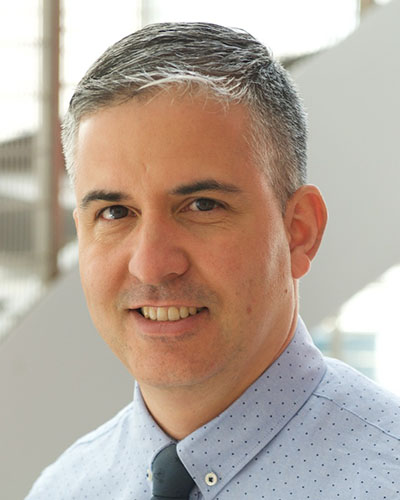
In 2002, Professor Fernandez-Romero joined the Center for Biomedical Research at Population Council in New York City, where he led the pre-clinical virology team. There, he has conducted extensive research on microbicide candidates to potentially prevent the acquisition of human immunodeficiency virus (HIV) and other sexually transmitted infections (STIs). He has published widely in the areas of virology and translational medicine and is a member of the American Society for Microbiology and the International AIDS Society.
After joining the BMCC science department in 2016, Professor Fernandez-Romero continued to collaborate as a visiting scientist with the Population Council. BMCC students who have been trained in lab protocols and aspire to enter STEM careers join him one day a week at the Population Council’s labs at Rockefeller University, and assist in this important work.
“I see my role as an academic to be not just a reproducer of facts but actually a farmer to sow knowledge and scientific curiosity in the upcoming generations,” he says. “My hope is that by teaching and mentoring students at BMCC, I can make a modest contribution to increase the interest in STEM careers and also raise the profile of minorities in these careers.”
Chris McCarthy is an Assistant Professor of Mathematics at BMCC and received his Ph.D. in mathematics from the CUNY Graduate Center. Professor McCarthy is a member of the “BMCC Designing for Success” Pedagogy Committee, a faculty mentor in the BMCC Teaching Academy, and has just joined the BMCC CETLS Advisory Board. A long-time supporter of the Open Educational Resources (OER)/ Zero Textbook Cost (ZTC) movement, he was a member of BMCC’s pilot OER workshop in 2015.
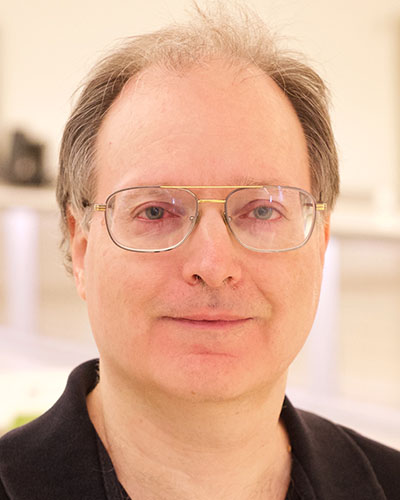
Professor McCarthy has collaborated with colleagues on research in a number of areas. These include the project Virtual Pascal’s Triangles: The Ballot Problem and the Method of Images(RJMT, June 2017) with BMCC Mathematics Professor Johannes Familton; Solid Wastes as an Eco-Friendly Alternative for the Decontamination of Wastewaters(C3IRG-Round 12) with BMCC Science professors Abel Navarro and Kibrewossen Tesfagiorgis, and numerous papers and projects related to teaching and modeling with differential equations, with USMA West Point Mathematics Professor Emeritus Brian Winkel.
With Professors Terrence Blackman (Dean of Sciences, Medgar Evers College CUNY) and Familton, McCarthy initiated the American Mathematical Society’s Special Session on Quaternions at the 2017, 2018, 2019 (and forthcoming in 2020) Joint Mathematics Meetings. He serves on the Board of Advisors of SIMIODE, which promotes the teaching and learning of differential equations with mathematical models, and has served as co-editor of special issues of PRIMUS (Taylor and Francis) dedicated to differential equation models.
So far at BMCC, Professor McCarthy has mentored student researchers in 30 projects, and through programs including the BMCC Honor’s Program,CRSP,CSTEPand MSEIP.
“One of my favorite roles as a professor is mentoring student research,” he says. “However, I also believe it is very important to try to help students who have difficulties in math; to build up their confidence, to help them to realize that they can do it if they don’t give up. I am very proud of all my students.”
Kathleen Offenholley is a professor of mathematics, with a Ph.D. in mathematics education. She has been teaching mathematics for more than 20 years. Her research looks at discussions in online math classes, and how to use games in math education. She is currently working on an NSF grant to investigate students’ understanding of algebra concepts and serves as a steering committee member of the CUNY Games Network, which connects CUNY educators who are interested in games, simulations and other forms of interactive teaching.
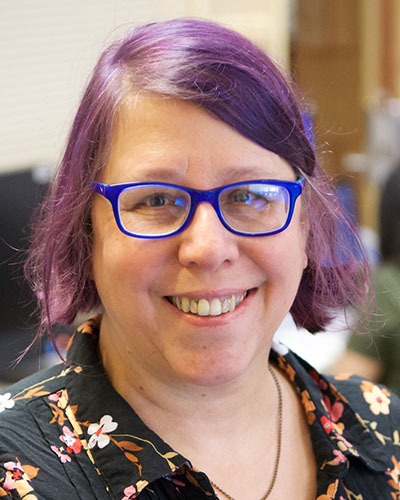
Professor Offenholley believes in active and inclusive learning, she says, and that the classroom can be a place of joy. She often uses learning games to begin an activity to get students “primed” to start thinking. Her classroom research shows that when students enjoy a class more, their ability to learn more deeply increases.
“There is something about joy and laughter that allows us to open up to new ways of thinking,” she says, and cites as inspiration, the writer Bell Hooks, who “describes love as a combination of care, commitment, knowledge, responsibility, respect and trust. Those six things underlie and inform all the other things I do.”
Professor Offenholley was featured in the 2015-2016 BMCC publication Marks of Excellence, in an article that highlighted her work with Professor Ching-Song Wei to develop a video game for STEM majors at BMCC. She is also included in an August 2016 article in The Hechinger Report that examines the value of game-based learning for college students in remedial math classes.
Offenholley includes among the teachers who have inspired her, “Alyse Hachey, formerly of the BMCC Teacher Education department, who taught the first online course I ever took, at Columbia Teacher’s College. Without her to inspire me, I would not have gone on to teach math online. Gay Brooks and Holly Messitt were amazing teachers for the WAC trainings, and Leslie Craigo, also in the Teacher Education department, taught me so much about diversity and inclusion in her workshops. Finally, Brenda Jones, my karate teacher, taught me by example how to love my students. She also listened with endless patience as I described (and struggled through) my early teaching days at BMCC.”
Rifat Salam is an Associate Professor of Sociology in the Social Sciences, Human Services and Criminal Justice Department. “My teaching philosophy focuses on developing students’ conceptual, analytic, and writing and communication skills, and it reflects a wide variety of pedagogical approaches, from Writing Across the Curriculum to contemplative practices in the classroom,” says Professor Salam.
Through the use of writing and active learning, she has students engage directly with course materials to develop their ability to think critically and independently.
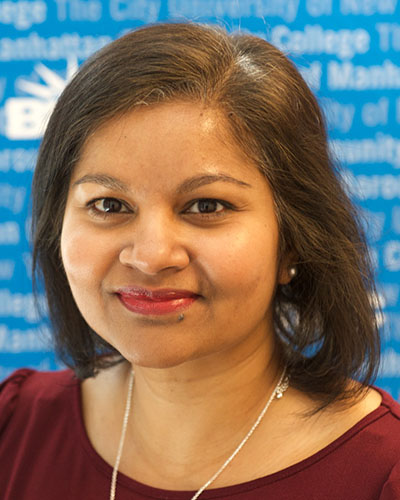
“I work to cultivate a classroom community in which students learn from each other and situates myself as a learner alongside them,” she says. “Regardless of their major, I design my classes to be an opportunity for students to develop their academic skills and develop themselves as engaged and critical members of society.”
Professor Salam has served as a co-coordinator of the Writing Across the Curriculum (WAC) program since 2009, when she joined the faculty at BMCC. She is a member of the CUNY WAC Council and has developed pedagogical workshops and training materials for CUNY Graduate Center Ph.D. students. She has also developed and facilitated teaching-related workshops for full- and part-time faculty across disciplines.
She is an active member of the American Sociological Association (ASA), and one of only two community college faculty on the ASA Taskforce on Liberal Learning and Sociology. In that role, she has helped develop content and skills recommendations for the foundational curriculum of the undergraduate sociology major. Professor Salam was also one of the primary authors of the Taskforce’s publication, The Sociology Major in the Changing Landscape of Higher Education: Curriculum, Careers, and Online Learning. This document guides external evaluators who review and assess sociology programs across the country, and it serves as a critical resource for faculty, department chairs and college administrators.
“I am passionate about teaching and it is no less than a calling for me,” Salam says. “Knowing that I can make a difference in my students’ lives motivates me not only in my own teaching but to share my knowledge, experience and enthusiasm with my colleagues at BMCC, CUNY and beyond.”
Sam Sloves teaches Film History and Screenwriting in the Media Arts and Technology Department at BMCC. He holds an MFA from Columbia University and also possesses a MsEd in Education. His work in the film industry includes collaborating as a producer on two feature films, including the Sundance award-winning Ambush of Ghosts. His screenplays have won awards including a Sloan Foundation Grant, a staged reading at the Hampton’s Film Festival and screenwriting contests, as well as being named a Nichols semi-finalist. Sloves’ current projects include a documentary about his mother, Detour Off the Trail of Tears, A Road Trip to Find Identity While Alzheimer Steals It. Prior to joining the faculty at BMCC, Sloves served as a public school principal for the New York City Department of Education.
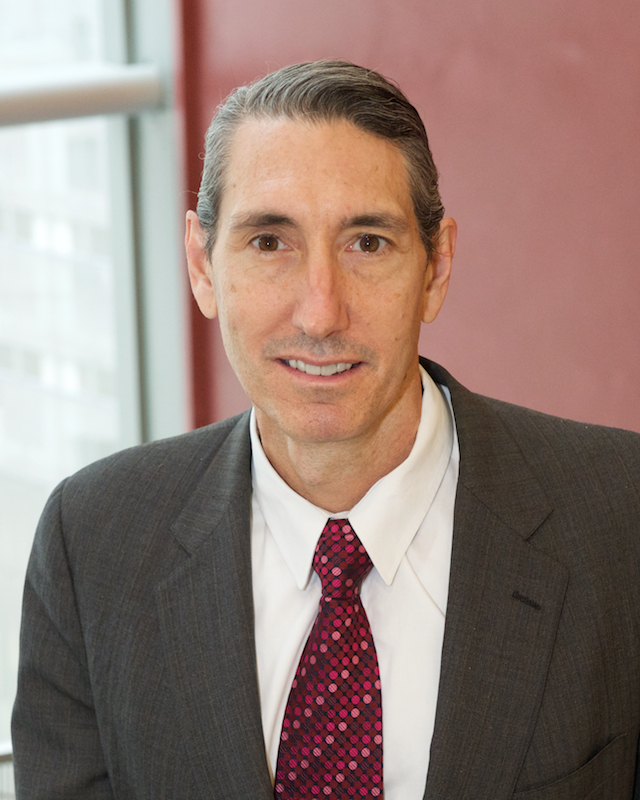
“My personal ‘Socratic method’ rests on the premise that I do not have all the answers,” Sloves says, adding that he relies on his colleagues in the Media Arts department and his students’ suggestions and feedback in order to constantly “tinker” with his pedagogical approach.
“Each semester is an exploration in ways to increase student learning, finding the right kind of friction to enhance student achievement,” Sloves says. “Alleviating bureaucratic friction via the Commons, the Open Lab, Open Educational Resources (OER) and Zero Textbook Cost (ZTC) programs, while increasing contemplative friction with peer discussion and group projects,” is another strategy he uses.
STORY HIGHLIGHTS
Annual Distinguished Teaching Awardees for 2019 are Professors Jose A. Fernandez Romero, Chris McCarthy, Kathleen Offenholley, Rifat Salam and Sam Sloves
Committee chosen by the BMCC Academic Senate selected the awardees from more than 400 nominations
Winners and finalists celebrated at a reception in the Shirley Fiterman Art Center, April 30 at 4 p.m.

